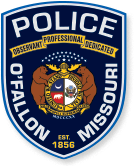Emergency Management
Your resource for preparedness
The Emergency Management division is available to provide coordination and support services to the police and other departments during times that routine operations are taxed and additional resources are required. See below to find some helpful tips for your preparedness efforts.
Sign-up for O'Fallon CERT
Register now for the next O'Fallon CERT class and learn how you can help in the event of an emergency. Classes are held over three days (Friday 6–10 p.m., Saturday 8 a.m. – 5 p.m. and Sunday 8 a.m. – 5 p.m.) at the O'Fallon Justice Center. Please refer to the CERT webpage for details on the next series of classes.
Community Emergency Response Team (CERT) application (PDF)
Preparing for severe weather
Here in the Midwest, you can be sure that no matter what time of year, we are at risk of severe weather. Tornadoes, severe storms, strong winds, hail, flash floods, heavy snow, ice and severe hot and cold temperatures all can cause major issues for O'Fallon residents. You can be sure that severe weather will happen, and eventually it will affect you in some way. So the only thing you can do is to try and be as prepared as possible. There are no easy answers to the many questions and problems that can arise. You have to prepare for your situation with the resources you have available.
Step 1: Identify the severe weather hazards you may face
In the Central United States, severe thunderstorms are a fact of life. These storms can produce tornadoes, damaging wind gusts, extreme temperatures, large hail, snow, ice and heavy rain that can produce flash flooding. At some point in your life, you will likely be faced with one of these hazards.
Step 2: Set up your plan
Everyone should have a severe weather plan for their home. Likewise, businesses need to have a plan for the workplace. There will be similarities, but there will also be differences between the two. Following are some ideas that can be applied to both.
- Establish who is responsible for the plan. Someone needs to be in charge. For a large workplace that runs several shifts, you may have several people responsible for the plan.
- How will you receive weather warnings? NOAA Weather Radio is a great way to receive severe weather warnings from the National Weather Service. You can also get information from the commercial media, and the Internet. There are also services today that will send weather warning directly to cell phones. Do not depend solely on one method. Have multiple ways to receive critical weather information.
- If you receive a weather warning such that you need to activate your plan, how will you inform the people you are responsible for? In a home that should not be a problem, but in a large workplace you have to have a method for communicating the severe weather information to everyone present.
Step 3: Practice your plan!
Conduct drills and then review the drill to find strengths and weaknesses and make improvements where necessary. It is hard to foresee every circumstance, but drills can often bring out problems that were not previously seen.
For more information on what you can do to protect yourself from severe weather, please visit: www.ready.gov/severe-weather
Emergency Alert System Outdoor Warning Sirens
The City of O’Fallon has a system of 16 Outdoor Warning Sirens positioned throughout the City of O’Fallon. The City’s network operates in conjunction with the St. Charles County Emergency Alert System. The sirens are designed to be heard if a resident is outdoors. During periods of severe weather when indoors, residents are encouraged to watch local news channels or listen to local radio stations. For those that want their severe weather forecast directly from the National Weather Service, a National Oceanic and Atmospheric Administration (NOAA) weather radio can be purchased.
The St. Charles County Department of Emergency Management is responsible for activating the sirens for several agencies including the City of O’Fallon. The sirens are activated for an actual emergency, or monthly for testing purposes. No all-clear activations are utilized. The sirens are maintained by the O’Fallon Police Department. Regular silent tests and repairs are conducted on an ongoing basis. When a siren is activated during an emergency, residents are encouraged to take cover and tune to a local news source to ascertain important details.
Quick tips for emergency situations
When catastrophe strikes a community, survivors may find that fire, police, medical, utility and relief services are stretched. Getting help might take hours or even days, so disaster preparedness is vital.
With this handy reference, you’ve taken the first step in learning what to expect, what to do, and how to minimize discomfort, stress and confusion.
If you are instructed to evacuate
- Listen to the radio or television for the location of emergency shelters and for other instructions from local emergency officials.
- Find out if you must leave immediately or should secure your home by unplugging appliances and shutting off main utility valves.
- Wear protective clothing and sturdy shoes.
- Gather your household and Disaster Supplies Kit in one vehicle to keep the family together and avoid traffic congestion.
- Use travel routes specified by local authorities and don’t use shortcuts because certain areas may be impassable or dangerous.
After a disaster
- Listen to local radio and TV for information about where you can get disaster relief assistance.
- To avoid an explosion, use only flashlights to inspect homes or buildings.
-->
Contact Police Department staff
| Officer Larry Bunt | lbunt@ofallonmo.gov | 636-949-7900, Ext. 4642 |
 O'Fallon, MO 63366
O'Fallon, MO 63366
